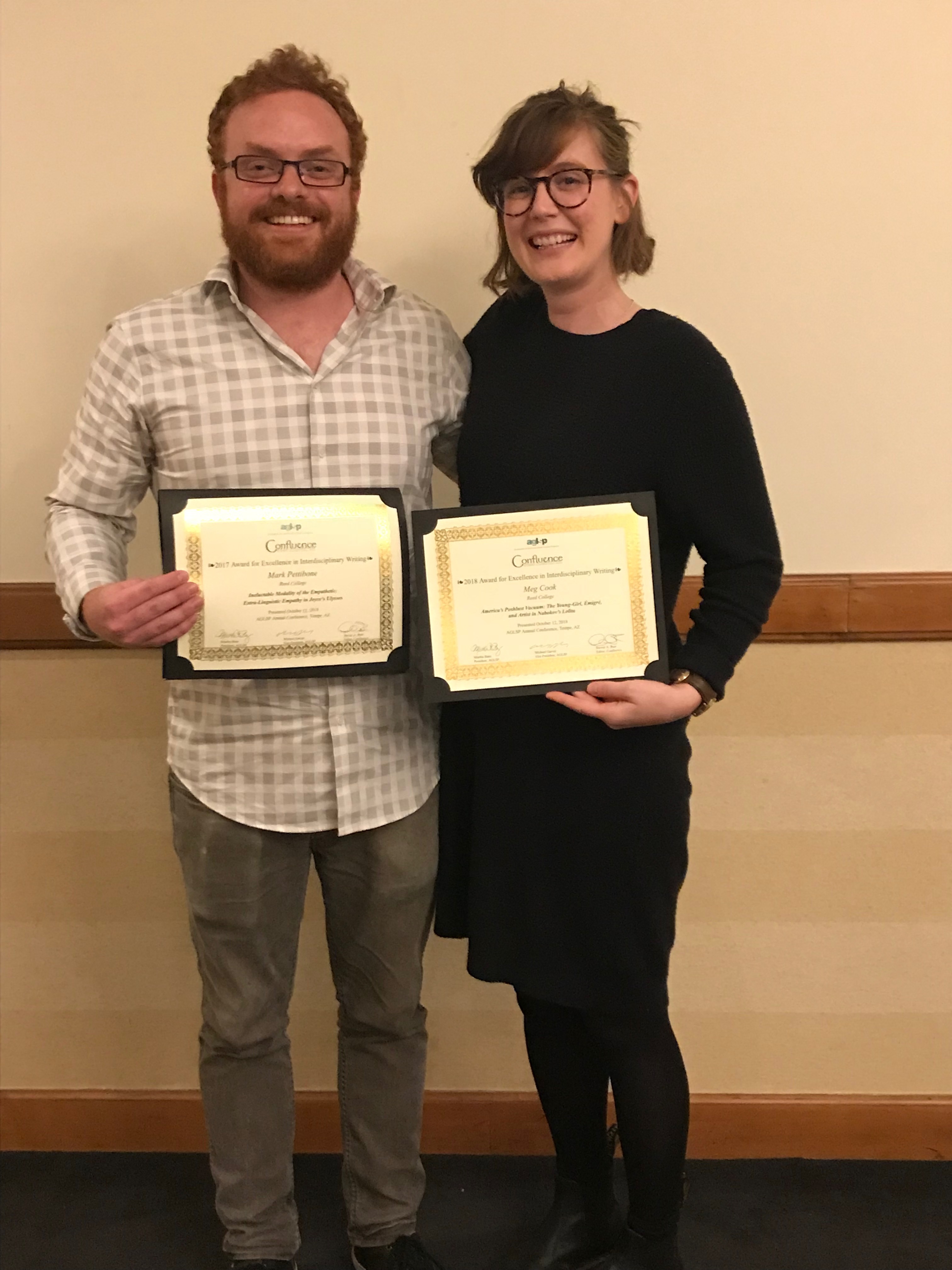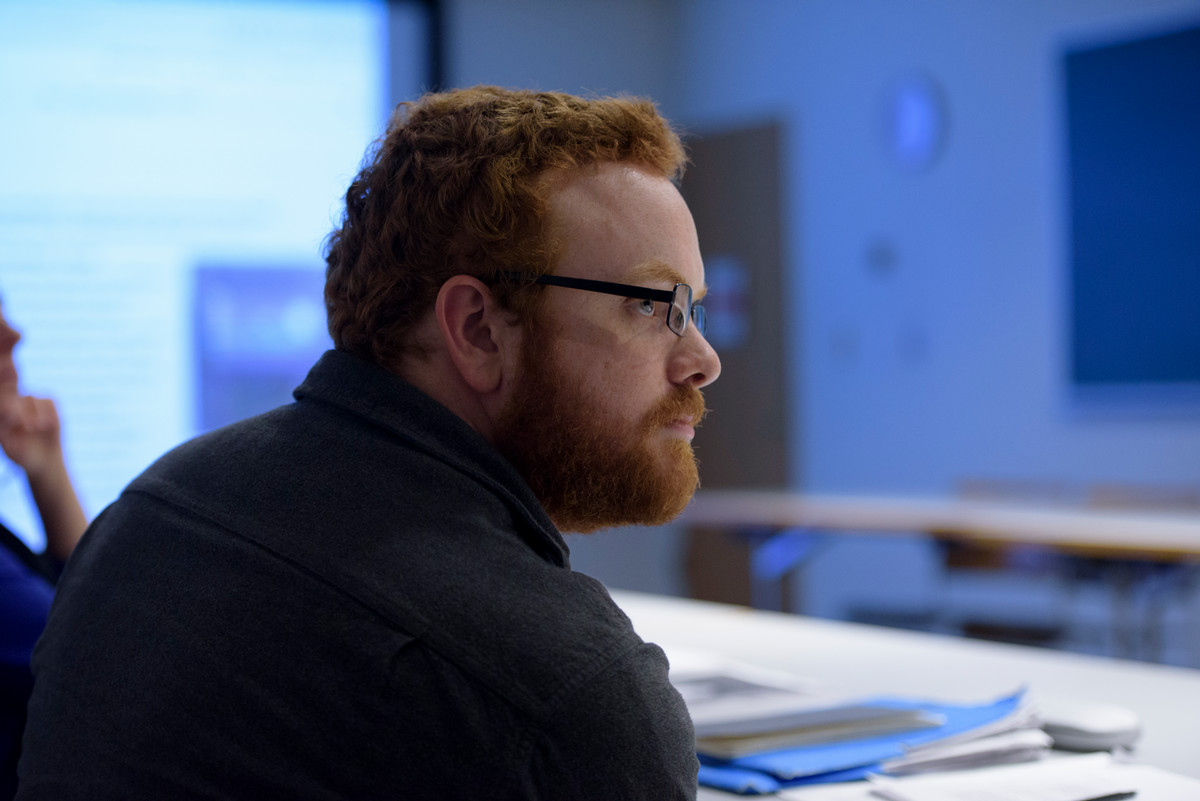MALS story
Mark Pettibone '18 answers questions about his Confluence paper and experience with the MALS program
The limits of language as a communicative link between people is a problem that Mark Pettibone thinks deeply about in his essay, Ineluctable Modality of the Empathetic: Extra-Linguistic Empathy in Joyce's Ulysses. His essay asks and probes answers to the question, "is empathy possible in the modern world via language alone?" Pettibone’s work was selected as the best interdisciplinary writing of 2017 by Confluence: The Journal of Graduate Liberal Studies. Confluence is a peer-reviewed interdisciplinary journal published by the Association of Graduate Liberal Studies Programs (AGLSP), which accepts submissions from students and faculty in GLS programs nationally. It offers two annual student writing prizes, one recognizing creative writing, the other recognizing excellence in interdisciplinary scholarship. To be considered for an award, the student’s work must be nominated by a faculty member or program director.
Steven A. Burr, editor of Confluence, noted that Pettibone’s manuscript exemplified the best qualities of interdisciplinary scholarship: “Winning submissions present original ideas or interpretations in an engaging and intelligent style, and demonstrate the interdisciplinarity that is the hallmark of graduate liberal studies. (The award) is an opportunity to highlight the tremendous work that’s being done in, and could perhaps only be done in, graduate liberal studies.” In his essay, Pettibone investigates the extra-linguistic modes of connection that comprise authentic human communication in Ulysses: touch, shared emotion, and a reading experience that “grounds reader and character in an intimacy” that transcends the text. On a wider level, Pettibone’s work applies to the challenges that fractured and incomplete communication present for society today, and represents a step toward his ultimate goal of translating his theoretical interests in community and empathy into concrete praxis.
You can find a copy of Pettibone’s essay here. Pettibone took the time to answer some questions about the Confluence award, his experience in the Reed MALS program, and his future plans:
When did you learn that you had won the Confluence award?
I submitted my Ulysses essay for the AGLSP Confluence writing award in February 2017 and expected to hear back within a month or so. After a couple of months had passed, I assumed my essay didn’t make the cut. Finishing up my last semester of classes and preparing for my thesis, I forgot all about the award submission. I missed the first email in October announcing my essay was selected, and it wasn’t until the Journal editor directly contacted me that I learned the good news. It couldn’t have come at a better time, as I was beginning to have doubts about my ability to meaningful talk about James Joyce’s Ulysses, which is the text I’m currently working with for my thesis.
Did your paper arise from a particular course?
Jay Dickson’s course, “James Joyce,” reworked my relationship to literature. I majored in English at Gonzaga University, where I was introduced to figures like Virginia Woolf and Henry James. I knew I enjoyed reading literary works and constructing arguments from close readings, but it wasn’t until I got to Reed that I really developed the groundwork necessary to apply my own voice to a text. If it weren’t for Jay’s course, and particularly his teaching style, Joyce would remain beyond my intellectual reach to this day.
This paper represents the beginning of your thesis project. What is the next step for your work?
My paper focuses on two characters, Stephen and Bloom, and the various ways that their obscure relationship with one another and the reader emerges outside of language. But the book’s final episode, “Penelope,” throws new problems regarding empathy, desire, and language into the mix. The next step, then, is to look at Molly Bloom’s monologue as a kind of antithesis to my previous argument. Molly leaves no room for an “outside” of language, which requires a new interpretation to make sense of her singular and final perspective. Instead of classifying Molly’s monologue as “stream-of-consciousness,” as do many critics, I develop a concept called “stream-of-affect” to open up new exegetical possibilities for literary empathy.
Overall, which class/es have been most meaningful to shaping your thesis project/this paper?
I see this paper and my thesis emerging from my entire experience in Reed’s MALS program. Aside from Jay Dickson’s “James Joyce,” Ülker Gökberk’s “Fin-de-Siècle Vienna” course introduced me to European modernity and its perceived crisis of language, which figures heavily in my Ulysses analysis. I presented on Ludwig Wittgenstein’s Tractatus Logico-Philosophicus, which maintains reservations about language’s ability to represent lived experience. That emotions and feelings inhere as real, yet ineffable qualities in music and works of art helped me to see philosophy and aesthetics anew.
Pancho Savery’s “Critical Race Theory” challenged my conception of the “other” with respect to culture, society, and my self, invigorating my interest in community and empathy. Walter Englert’s “Socrates and Plato” muddied the lines between philosophy and literature, while contributing to a stronger use of the dialectic in my own writing. Troy Cross’ “Philosophy of Mind” exposed me to the analytic philosophy tradition that runs parallel to this “continental” one. Contradictions underlying the mind-body dualism, specifically, inform the impetus for this paper’s reconciliatory disposition. Dana Katz’s “Renaissance Space” offered me a wellspring of phenomenological and spatial theory, which I apply to Joyce’s “urban novel” to understand the text’s own practiced spaces. Kris Cohen’s “Video Art and Politics: 1968-Present” and Akihiko Miyoshi’s “Internet Literacy and Practice” acquainted me with the formal structures and socio-political implications that inhere in a given medium. Despite their emphases on digital media, both classes played significant formative roles in my understanding of the novel.
Did you come across any surprises when you were writing this paper?
One of my favorite aspects of writing is the serendipitous moments that appear out of nowhere, reconfiguring often disparate and meandering thoughts into coherent structures. For instance, I was struggling to articulate a more nuanced, dynamic conception of empathy and cognition to apply to Molly Bloom’s “Penelope” episode. I was looking for an essay by Walter Benjamin, when Edith Stein’s "On the Problem of Empathy" (1916) fell into my lap, so to speak. She articulates, around the same time Joyce is writing Ulysses, exactly the concept of empathy for which I was searching. This instance, and many others like it, displays the porous and unstable nature that is the research process.
What originally inspired you to pursue a Liberal Studies degree?
I often joke at family reunions that my liberal studies degree is “impractical, but I love it.” This serves for humorous, self-deprecating conversation, but it couldn’t be further from the truth. I do love it, yet I also firmly believe in its practical applications. It boils down to communication. An interdisciplinary education requires that one inhabit different fields, developing the tools and confidence to make solid, informed arguments within a broad context that ultimately maps onto the “real world.” Enrolling in the MALS program meant, for me, developing these communicative tools and expanding my intellectual horizons, growing into a more informed and active global citizen.
What has been your favorite part about studying in the MALS program?
The MALS classroom fosters a particular environment that I find fulfilling; it is demanding and welcoming, engaging and open, rigorous and exciting. Representing all walks of life, the students bring their own mature experiences to conversations, which invigorate discussion at a more concrete level than I have experienced in other educational settings. Conversations, some weeks, escape the classroom and venture to the local pub, where a different level of intimacy sheds new light into previous topics and personalities.
What are your future plans after Reed?
After completing the MALS degree in January, I plan on applying to PhD programs in English or Information Science. I view my MALS experience as the necessary intermediate step from an undergraduate to a doctoral program, providing the key tools in that transition. But I also value my MALS experience in and of itself, as I would happily do the whole thing over again.
Who is your favorite philosopher? If you could ask her/him one question, what would it be?
I have a new favorite philosopher and thinker every week. At the moment, though, Gilles Deleuze and, by extension, Felix Guattari, hold that position for me. Although reading A Thousand Plateaus is often as frustrating and daunting as reading Ulysses, the concepts start to form into intuitions—new styles of interpreting and thinking with the world—the longer one spends with them. My question for the heterogeneous, yet singular D&G: how can I become more like a jazz musician to improvise with, and change, the stagnant social and political complexes that grow stronger and more threatening each day?

Congratulations Mark & Meg (the 2018 award winner)!
—Julie Felix, MALS '13
